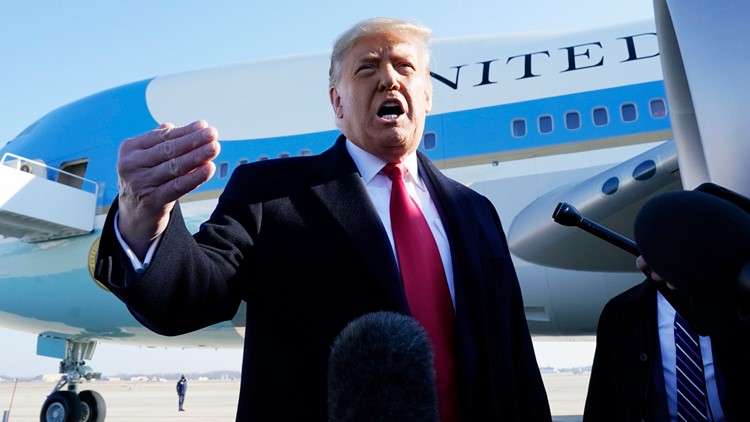The House has drafted an impeachment resolution, charging President Donald Trump with “incitement of insurrection.”
But the Senate, which is currently Republican led, has indicated that they’ll take their time taking up the articles of impeachment if they pass the House. That means they’ll likely still be pending once Trump leaves office.
But, is the process able to continue once Trump leaves office? And if so, what’s the point? Those are the questions currently being asked as the House moves forward with Trump’s second impeachment.
THE QUESTION
Can the process of impeachment continue to move forward once Trump leaves office? If so, what would impeachment accomplishment?
THE ANSWER
The move, at least when it comes to presidents, is largely unprecedented and therefore there are a lot of unknowns. Still, precedent set in the impeachment cases of judges indicate that the process can continue. And the end goal of that would be to prevent him from running for office again.
WHAT WE FOUND
A Congressional Research Service report from 2019 includes a short section on impeachment after an individual leaves office. In one instance, Secretary of War William W. Belknap resigned two hours before the House impeached him. Nonetheless, the Senate conducted a trial in which Belknap was eventually acquitted.
During the trial, Belknap’s counsel objected to the trial on the basis that Belknap was a private citizen following his resignation, claiming that it was outside the Senate’s jurisdiction. The Senate voted on the issue and the majority of the Senators believed the trial was still within their jurisdiction. That would presumably set a precedent that the Senate could continue an impeachment trial on Trump after he sets office.
However, the CRS report also found a number of cases where the resignation of an official led to the end of an impeachment trial. No impeachment vote was taken by the House after Nixon’s resignation, even though the House Judiciary Committee had already reported articles of impeachment to the broader house. Impeachment proceedings were also ended following the resignations of three different judges who were subject to impeachment.
And, generally, legal experts have split opinions on this. Some believe Congress cannot continue impeachment once the president leaves office, others believe a trial in the Senate can continue after the president leaves office as long as the House impeaches the president before then, and others believe impeachment is permissible at any time, even if the process doesn’t start until after the president has left office.
If the Senate chooses to move forward with an impeachment trial after Trump leaves office, there is precedent for a vote to be made on disqualification from future office. However, that vote typically takes place after a vote to convict and remove.
Cornell Law describes previous cases in which the Senate voted to disqualify someone from office after they had voted for removal. This vote has historically only required a simple majority to pass as opposed to the two-thirds required for conviction and removal. However, a disqualification vote can only happen after a vote on conviction, which as stated above, still requires a two-thirds majority to pass.
While some cite the Former Presidents Act as another incentive to continue impeachment after Trump leaves office, it wouldn’t matter. The act gives former presidents an annual pension, as well as budget for travel. That act specifically defines a “former president” as a person “whose service in such office shall have terminated other than by removal pursuant to section 4 of article II of the Constitution of the United States of America.” That refers to an impeachment that takes place while the president is in office and thus removes the president from their office.
It’s not clear, however, whether a conviction after a president has already left office would prevent said president from claiming the benefits of this act. The definition above specifically says it excludes presidents who are “removed” by impeachment, something a late impeachment would fail to do.
Something you’d like VERIFIED? Click here to submit your story.



